www.originalbeans.com
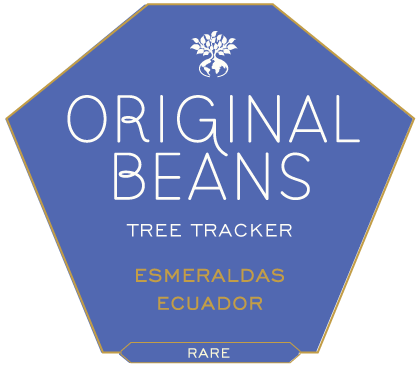
PROJECT TIMELINE
Updated: October 2023
Summer 2023
The Mono Bravo community received specialized cacao grafting training from William Carlosma to enhance their skills. Grafting ensures the purity of newly planted cacao trees, impacting both productivity and quality.
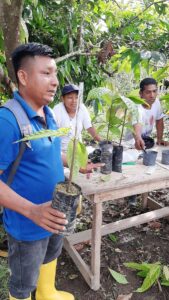
Summer 2023
In 2022, 5,000 seedlings from the Mono Bravo nursery were distributed to 14 families in the Mono Bravo community.
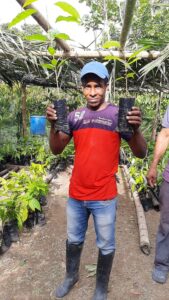
Summer 2023
The Mono Bravo community took part in skill training on gathering seeds from native cacao trees and cultivating seedlings in their established nurseries.
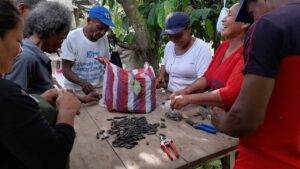
Summer 2023
The Analog Forestry network promotes forest conservation and the use of native tree species. They collaborate with the Ecuadorian Analog Forestry Network to study tree interactions in diverse agroforestry systems.
The Loma Linda community received 2,000 native cinnamon (Ishpingo) trees and around 1,000 native tree seedlings from a local nursery. These 3,000 seedlings enhance and diversify their agroforestry systems. Ishpingo, a slow-growing tree, pairs well with cacao trees. After 10-15 years, it can be harvested, and its high-value flowers can be dried. This is a valuable product for remote communities due to its favorable price-to-volume ratio.
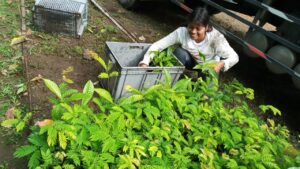
Spring 2023
Cacao growers in Loma Linda received skill training in grafting cacao trees, a process ensuring the purity of newly planted cacao. In winter 2022, approximately 1,500 trees were grafted using materials from 100 selected mother stock trees.
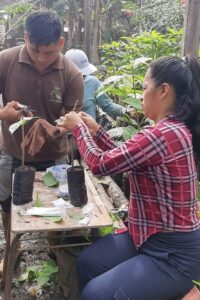
Spring 2023
All cacao growers in the Mono Bravo community participated in a knowledge-enriching cacao pruning training, with a focus on veteran trees aged between 50-100 years. This training aimed to enhance productivity while preserving ancient cacao forests.
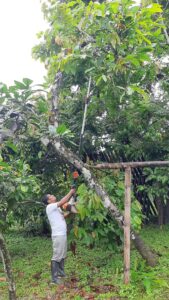
Spring 2023
Vegetative material was collected from 100 identified native cacao trees to graft young cacao trees, preserving these genetic strains. The young trees will be planted in the clonal garden to safeguard the genetic material from the 100 identified native cacao trees.
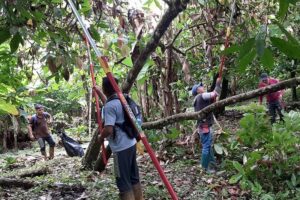
Winter 2022
The Loma Linda community nurtured 4,693 seedlings by the Cayapas River, distributing them to local farmers. Over 20 different species, mostly native to the Cotacachi Cayapas reserve cloud forest, were grown in this nursery to enrich cacao forests and agroforestry systems.
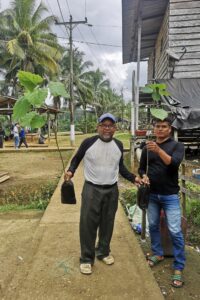
Winter 2022
All Mono Bravo cacao growers attended a capacity-building session on pruning, with a focus on large, older trees. This helps enhance tree productivity, even for those aged between 50-100 years, while preserving old cacao forests.
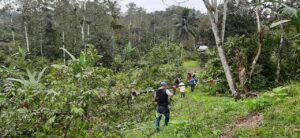
Winter 2022
A local NGO in Esmeraldas, Ecuador organized a 5-day Food Forest knowledge course for cacao farmers. It focused on the benefits of regenerative agroforestry and cacao forests in providing food and medicine to local families. The goal was to enhance local knowledge of organic, regenerative agriculture and share it within their communities and beyond.
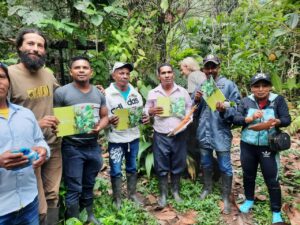
Winter 2022
Local expert Wiliam Carlosama conducted a training on forest conservation to motivate the community to continue their efforts and actively engage in reforestation.
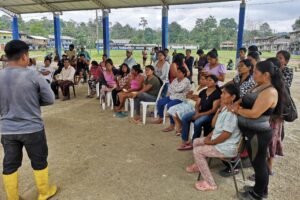
Winter 2022
In celebration of the end of 2022, Mono Bravo growers gathered to enjoy delicious hot chocolate made from their own cacao. They also reflected on the year’s activities, training courses, and started planning for 2023.
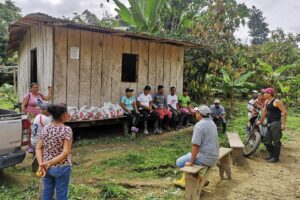
Autumn 2022
The Greenhouse Gas Balance Assessment for Esmeraldas cacao’s climate was conducted by the field team, led by Piura project leader Littman, traveling from Peru to Ecuador. They assessed the number of trees, species, altitude, and diameter on 20 sample farms.
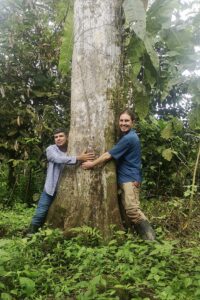
Autumn 2022
In collaboration with the Cachi community, our bean team member Rosaura Laura (Peru) initiated a cacao collection project along the Cayapas river. The project aimed to rescue and select the purest and most flavorful cacao trees in the region. Within two months, 100 mother stock trees were identified for their exceptional flavor, productivity, and pest resistance. Many of these trees are over 100 years old and naturally thrive near the Cayapas river.
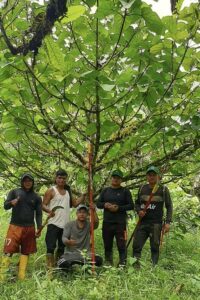
Autumn 2022
In collaboration with the Cachi community, our bean team member Rosaura Laura (Peru) initiated a cacao collection project along the Cayapas river. The project aimed to rescue and select the purest and most flavorful cacao trees in the region. Within two months, 100 mother stock trees were identified for their exceptional flavor, productivity, and pest resistance. Many of these trees are over 100 years old and naturally thrive near the Cayapas river.

Autumn 2022
Over 100 micro fermentations of beans from selected mother stock trees were conducted to identify the most flavorful native cacao varieties in the region. These selected trees will be provided to our growers in the future.
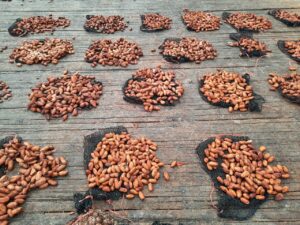
Summer 2022
The Mono Bravo community is cultivating 5,000 locally selected Nacional cacao seedlings to enrich their cacao forests.
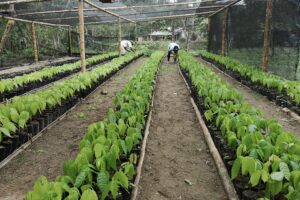
Summer 2022
Loma Linda community is establishing a nursery for 5,000 trees to recollect and regrow at least 10 different local wood species from the forests.
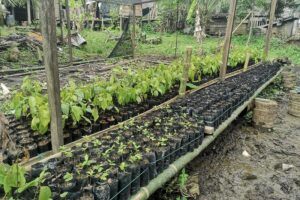
Summer 2022
Our Sales Leader in Hospitality, Patrick, visited the project with a group of German and Austrian chocolate makers/manufacturers to witness the impact of their chocolate choices on the ground. They supported the nursery setup to gain a better understanding.
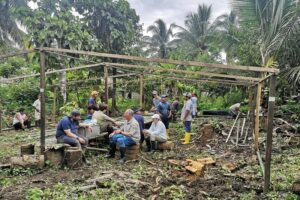
Summer 2022
Local forest and nursery expert, Wiliam Carlosama, joined the Original Beans team to assist with the nursery and the collection of native seeds and cacao.
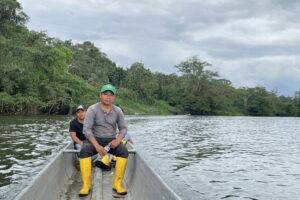
Summer 2022
Thanks to our partner Bean & Goose, a motorized canoe was acquired for the Chachi Communities. It enables the transportation of cacao from remote indigenous communities along the Cayapas river to Loma Linda (2-4 hours) for fermentation and drying. Additionally, it transports dry cacao from Loma Linda to the Borbon port (4 hours), from where it’s sent to our partner’s warehouse in Guayaquil. The canoe can carry up to 2.5 tons of dry cacao beans.
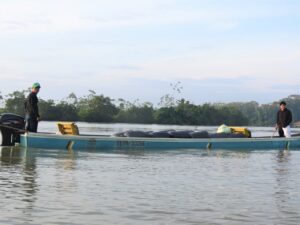
Spring 2022
An audit on the farm to evaluate the growth of the timber trees that have been planted in the last few years is being conducted.
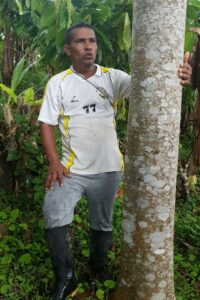
Spring 2022
Our local team starts the installation of individual wastewater treatment plants to improve the living conditions of all community members in Mono Bravo.
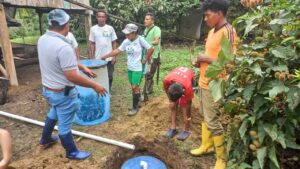
Winter 2021
Training courses in organic agriculture and organic certification norms are being held.
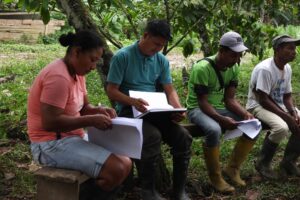
Autumn 2021
Farmers receive cinnamon seedlings to keep improving the diversity of their cacao forest.
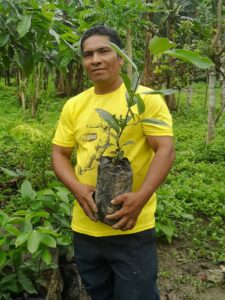
Summer 2021
We plant 3.000 balsa tree seedling in the community owned nursery in Mono Bravo.
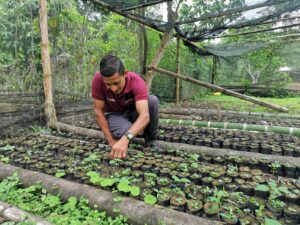
Spring 2021
The Bean Team provided a training course in forest monitoring and GPS tracker usage in the community-owned forest areas of Mono Bravo.
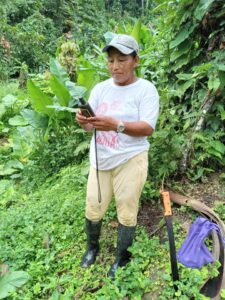
Winter 2020
We provided the partners with a training course in the grafting of young cacao trees in Mono Bravo to ensure that new cacao trees are productive.
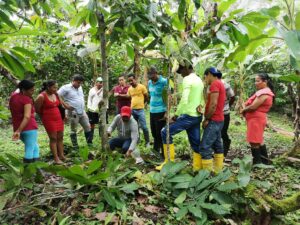
Autumn 2020
We set up the first nursery in the community Loma Linda at the Cayapas river for the production of 10.000 seedlings of native and commercial timber tree species.
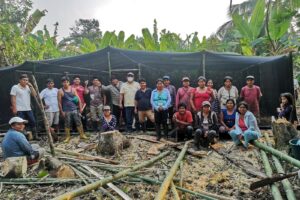
Summer 2020
We integrated several indiginous communities from the Cotacachi Cayapas Nature reserve into the local association and thereby into our Original Beans cacao & conservation project.
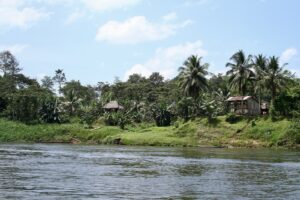
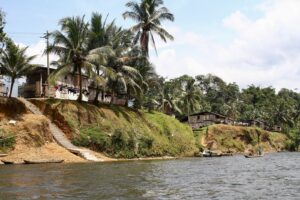
Spring 2020
We planted 13.507 native timber trees.
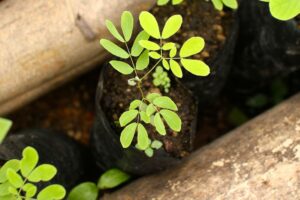
Winter 2019
We set up a new nursery for 15.000 native timber trees.
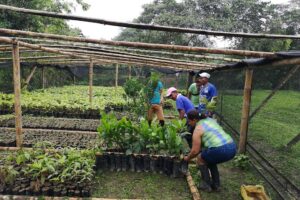
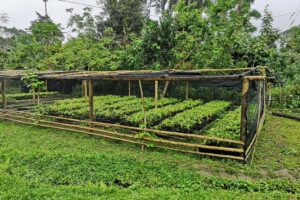
Autumn 2019
We distributed solar lamps for all members of the rural community.
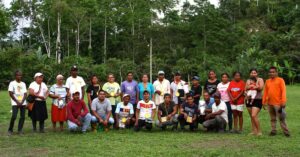
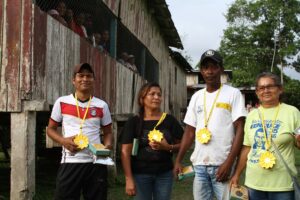
Autumn 2019
We gave training courses in preparation for fertilizers.
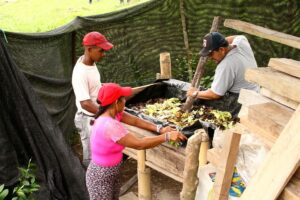
Summer 2019
We distributed organic fertilizers amongst our farmers.
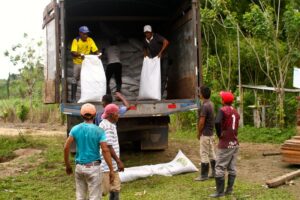
Summer 2019
We gave training courses in cacao grafting to preserve Nacional cacao.
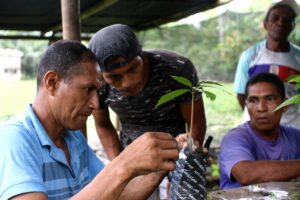
Spring 2019
Our Bean Team trained growers in biodynamic agriculture to move towards Demeter standard.
Autumn 2018
Our partners planted 4700 cacao and native wood trees.
SPRING 2018
Our Bean Team established the farmer association ASODPAMB.
AUTUMN 2017
Our partners planted 5300 cacao and native wood trees.
SPRING 2017
Our Bean Team renewed climate forest contracts with the growers.
AUTUMN 2016
We purchased our first cacao from Mono Bravo growers.
SPRING 2016
Our growers received their first organic certification.
AUTUMN 2015
Our Bean Team set up the first nursery in the village of Mono Bravo.
SPRING 2015
Our Bean Team renewed the climate forest contracts with the farmers.
SPRING 2014
Our Bean Team trained the growers for forest-friendly agriculture practices to get organic certification.
Summer 2012
Our Bean Team signed the first climate forest contracts with the farmers of Mono Bravo.
Esmeraldas 65%
Flowery notes of tropical fruits and nuts in this Nacional cacao balance gently like the tree-hanging sloths under the canopy of Ecuador’s last cloud forest.

